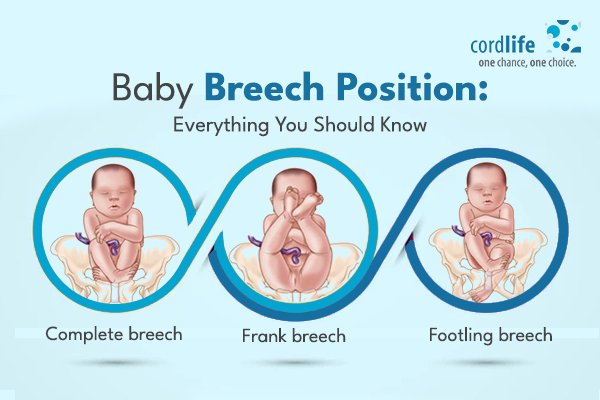Table of Contents
During childbirth, your baby is positioned in a way that the head moves out of the vagina first. However, for some of you, your baby changes his or her position while making his or her way out of the womb – a position which is often called the breech position of the baby in your womb.
What Does Baby Breech Position In Pregnancy Mean?
Unlike a “normal” pregnancy, where the baby in your womb has his or her head towards the birth canal ready to move out of the womb, in a breech pregnancy, the baby has his or her feet or buttock or both towards the birth canal.
How Many Types Of Baby Breech Positions Are There?
There are chances that around 3 to 4% of you will give birth to a breech baby. In fact, there are different types of breech foetal positions. They are as follows:
Complete Breech
This is when both of the baby’s knees are bent and his feet and bottom are closest to the birth canal.
Incomplete Breech
This is when one of your baby’s knees is bent and his or her foot and butt are close to the birth canal.
Frank Breech
This is the most common type of breech position. In this position, both the hips of your baby are flexed and both knees are extended. In fact, your baby’s feet are close to your baby’s head.
Footling Breech
In this condition, one or both of your baby’s feet may be pointing downwards. You can also expect a breach delivery; that is, your baby’s feet will come out of your womb first.
Transverse Lie
The baby is positioned horizontally across your uterus instead of vertically.
What Are The Causes For Your Baby To Be In A Breech Position In Your Womb?
The exact factors for your baby being in a breech position in your womb may not be known, however, according to American Pregnancy Association, there are a few things that might contribute to this condition. They are as follows.
Uterine Complications
The uterus looks like an upside–down hollow pear. However, sometimes, when you undergo a pelvic exam or ultrasound scan prior to or during pregnancy, your doctor and you might notice a different shape of your uterus. Not just that! There might be scar tissue, fibroids, and other uterine infections. As a result, your fully grown baby almost ready to leave your womb; will have limited room to move into head – down position.
Placental Problems
Your placenta develops by the 12th week of your pregnancy. The placenta is absolutely essential for foetal development. It nourishes the baby in your womb with all-essential nutrients and oxygen through the umbilical cord. However, there are conditions when the placenta undergoes several complications such as placenta previa, accreta, and retained placenta, which may not allow the baby to make a move downwards by the head.
Volume Of The Amniotic Fluid
Too much or too little of the amniotic fluid, makes it difficult for your little one to “swim” in your womb and can move between breech and head-down position.
What Are Baby Breech Complications?
You will know that your baby is in breech position when you feel very little movement or feel your baby’s kicks less than expected. You might also feel a hard lump near your ribs. That is your baby’s head. Therefore, if you planned to deliver your baby vaginally, your breech baby could change your plans. In this position, your baby’s arms, body or legs might move out of the cervix before it is dilated, and the head might get stuck in the birth canal, thus depriving your little one of the oxygen supplies. Your healthcare provider might confirm breech pregnancy, around the 36th week of pregnancy by the touch of the hands or through ultrasound scans. To handle breech delivery, your healthcare provider might suggest an emergency C – Section.
Apart From Getting A Caesarean, What Else Can You Do To Deal With Your Breech Delivery?
Well! There’s a lot you can do to deal with the breech pregnancy. Some of the methods that you can use are:
- Your doctor might apply pressure to your abdomen and try to turn your baby’s position. This method is known as external cephalic version.
- Walking and stretching your calves can help loosen the ligaments that support your uterus and pelvis.
- Attempt breech tilts. Keep your hips raised, may be around ½ feet above your head. You can keep your feet on a cushion.
- You can use essential oils like lavender, ginger, rosewood, etc. to deal with this situation.
- You can also go for a swim, or climb up and down the stairs.
We know that having a breech baby is a little unexpected for you. So, consult your healthcare provider to understand the nitty-gritty.
Along with this, don’t forget to visit the blog page, to get some more information on pregnancy, postpartum, baby care and the benefits of cord blood banking.
